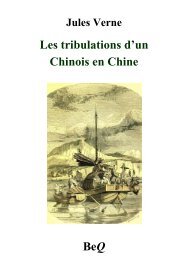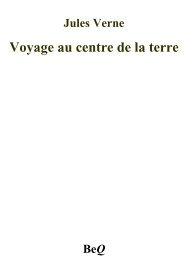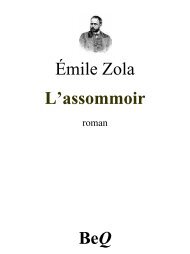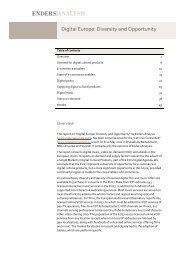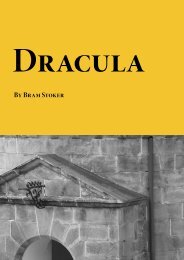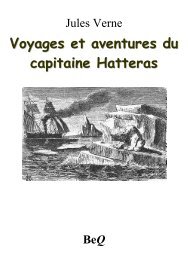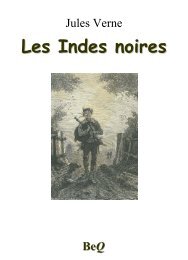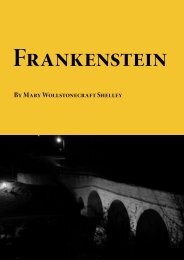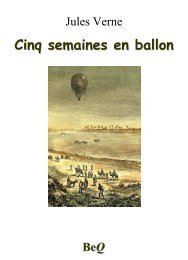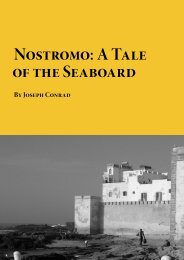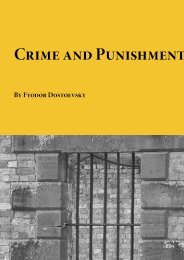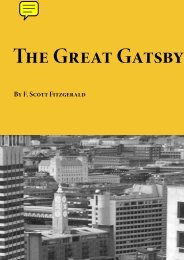- Page 5 and 6:
not matter, however. Only the Thoug
- Page 9 and 10:
just taken out of the drawer. It wa
- Page 11 and 12:
er of expressing himself, but even
- Page 13 and 14:
home and begin the diary today.It h
- Page 15 and 16:
And again, perhaps it was not even
- Page 17 and 18:
itual style of the orators of the P
- Page 19 and 20:
a part, but, on the contrary, that
- Page 21 and 22:
in bold capitals:WAR IS PEACEFREEDO
- Page 23 and 24:
and executions, to be sure that the
- Page 25 and 26:
neck i dont care down with big brot
- Page 27 and 28:
to pieces. The plaster flaked const
- Page 29 and 30:
him about wherever he went, and eve
- Page 31 and 32:
‘Goldstein!’ bellowed the boy a
- Page 33 and 34:
The voice from the telescreen pause
- Page 35 and 36:
them, looked grim as the loopholes
- Page 37 and 38:
Chapter 3Winston was dreaming of hi
- Page 39 and 40:
Suddenly he was standing on short s
- Page 41 and 42:
to think his way backward into the
- Page 43 and 44:
ous, though strictly speaking it ha
- Page 45 and 46:
moment when it was needed, and then
- Page 47 and 48:
knees aren’t bent. You can all do
- Page 49 and 50:
unrolled. Each contained a message
- Page 51 and 52:
the memory hole to be devoured by t
- Page 53 and 54:
cared. All one knew was that every
- Page 55 and 56:
programmes, plays, novels—with ev
- Page 57 and 58:
with no reasons given. One could as
- Page 59 and 60:
complicate the records too much. Wh
- Page 61 and 62:
ly, and upon the same evidence, as
- Page 63 and 64:
tried all over the place. They don
- Page 65 and 66:
their pannikins. From the table at
- Page 67 and 68:
words. Do you know that Newspeak is
- Page 69 and 70:
I do so agree with you’, uttered
- Page 71 and 72:
old, discredited leaders of the Par
- Page 73 and 74:
ut talk about keenness! All they th
- Page 75 and 76:
tion was to be REDUCED to twenty gr
- Page 77 and 78:
tually, so far as he could judge, t
- Page 79 and 80:
him, but perhaps for as much as fiv
- Page 81 and 82:
Chapter 6Winston was writing in his
- Page 83 and 84:
tutes was forbidden, of course, but
- Page 85 and 86:
only that he knew her more intimate
- Page 87 and 88:
whole life. The sexual act, success
- Page 89 and 90:
Chapter 7‘If there is hope,’ wr
- Page 91 and 92:
tion from one of the Party textbook
- Page 93 and 94:
In the old days (it ran), before th
- Page 95 and 96:
where underfed people shuffled to a
- Page 97 and 98:
ject articles in ‘The Times’, a
- Page 99 and 100:
The three men never stirred. But wh
- Page 101 and 102:
graph into the memory hole, along w
- Page 103 and 104:
ous association, had floated into h
- Page 105 and 106:
pulse he had turned away from the b
- Page 107 and 108:
proles applied to rocket bombs. Win
- Page 109 and 110:
to which the proles paid serious at
- Page 111 and 112:
Hurriedly, lest he should have time
- Page 113 and 114:
don’t satisfy. And a ‘ole litre
- Page 115 and 116:
about with a gang of lackeys who—
- Page 117 and 118:
what you can remember, that life in
- Page 119 and 120:
he stepped through the doorway. If
- Page 121 and 122:
if it so happened that you wanted t
- Page 123 and 124:
Though of course you’d have to pu
- Page 125 and 126:
owe me three farthings, say the bel
- Page 127 and 128:
Suddenly his heart seemed to turn t
- Page 129 and 130:
kill yourself in a world where fire
- Page 131 and 132:
FREEDOM IS SLAVERYIGNORANCE IS STRE
- Page 133 and 134:
Chapter 1It was the middle of the m
- Page 135 and 136:
more fingering, to get it unfolded.
- Page 137 and 138:
imbecile Parsons flopped down besid
- Page 139 and 140:
him within five minutes of reading
- Page 141 and 142:
when Winston secured his tray and b
- Page 143 and 144:
‘Victory Square, near the monumen
- Page 145 and 146:
men in shabby greenish uniforms wer
- Page 147 and 148:
hemmed them in, her hand felt for h
- Page 149 and 150:
The wooden-seated carriage in which
- Page 151 and 152:
to move closer to her now. She stoo
- Page 153 and 154:
and get you killed off?’‘Yes, s
- Page 155 and 156:
to feel now that the sash was gone.
- Page 157 and 158:
clung together; it was quite differ
- Page 159 and 160:
fell apart. The sun seemed to have
- Page 161 and 162:
past her without recognition. But w
- Page 163 and 164:
and did not often coincide. Julia,
- Page 165 and 166:
I was only on the kaleidoscopes. I
- Page 167 and 168:
week. ‘She hated it, but nothing
- Page 169 and 170:
oulders at the bottom. There was no
- Page 171 and 172:
‘We’re not dead yet,’ said Ju
- Page 173 and 174:
and spoke in generalities, with so
- Page 175 and 176:
‘Tomorrow afternoon. I can’t co
- Page 177 and 178:
‘Real sugar. Not saccharine, suga
- Page 179 and 180:
quarters and bought herself a compl
- Page 181 and 182:
She suddenly twisted herself over i
- Page 183 and 184:
hour clock with a sort of tolerant
- Page 185 and 186:
it, along with the mahogany bed and
- Page 187 and 188:
files of ‘The Times’ and alteri
- Page 189 and 190:
of suffocation.In the room over Mr
- Page 191 and 192:
is within five minutes of striking.
- Page 193 and 194:
in any case the Party was invincibl
- Page 195 and 196:
to the old days, before the Revolut
- Page 197 and 198:
thodoxy while having no grasp whate
- Page 199 and 200:
subject. I have never had anything
- Page 201 and 202:
e found,’ was what O’Brien had
- Page 203 and 204:
In the dream he had remembered his
- Page 205 and 206:
his share. She took it for granted
- Page 207 and 208:
camp along with his mother, or simp
- Page 209 and 210:
hand lying on the pavement and had
- Page 211 and 212:
human, what difference did it ultim
- Page 213 and 214:
lack-uniformed guard would suddenly
- Page 215 and 216:
suddenly the grim face broke down i
- Page 217 and 218:
cating effect. Actually, when he ca
- Page 219 and 220:
deprived of the power of speech. Hi
- Page 221 and 222:
preserved. When you receive orders,
- Page 223 and 224:
in it as handfuls of dust and splin
- Page 225 and 226:
O’Brien. ‘We shall meet again
- Page 227 and 228:
Chapter 9Winston was gelatinous wit
- Page 229 and 230:
microphone with one hand while the
- Page 231 and 232:
or the alliance with Eastasia, shou
- Page 233 and 234:
THE THEORY AND PRACTICE OFOLIGARCHI
- Page 235 and 236:
it, the Japanese islands and a larg
- Page 237 and 238:
ice-cap, that the three powers are
- Page 239 and 240:
and efficient—a glittering antise
- Page 241 and 242:
Nor was it a satisfactory solution
- Page 243 and 244:
But this would provide only the eco
- Page 245 and 246:
is its subject matter. The scientis
- Page 247 and 248:
noeuvre which involves the risk of
- Page 249 and 250:
sense. Actually the three philosoph
- Page 251 and 252:
clothing, to avoid swallowing poiso
- Page 253 and 254:
den. The best books, he perceived,
- Page 255 and 256:
there always comes a moment when th
- Page 257 and 258:
then become the High; but this time
- Page 259 and 260:
was made up for the most part of bu
- Page 261 and 262:
cialist movement and inherited its
- Page 263 and 264:
organization. Below Big Brother com
- Page 265 and 266:
uling group is a ruling group so lo
- Page 267 and 268:
think too deeply on any subject wha
- Page 269 and 270:
that country must always have been
- Page 271 and 272:
leap ahead of the truth. Ultimately
- Page 273 and 274:
of impudence in their deliberate re
- Page 275 and 276:
then the usual deep-lunged singing
- Page 277 and 278:
down there had no mind, she had onl
- Page 279 and 280:
Julia’s eyes. Her face had turned
- Page 281 and 282:
ar rosebud from a cake, rolled acro
- Page 283 and 284:
with knowledge, at a member of the
- Page 285 and 286:
Chapter 1He did not know where he w
- Page 287 and 288:
to be on good terms with the guards
- Page 289 and 290:
eference to something called ‘roo
- Page 291 and 292:
His troubled eyes were gazing at th
- Page 293 and 294:
keep still. Time passed. Twenty min
- Page 295 and 296:
He sank his voice, like someone who
- Page 297 and 298:
the way round the bench. The eyes o
- Page 299 and 300:
for weeks. Finish it off and let me
- Page 301 and 302:
save Julia by doubling my own pain,
- Page 303 and 304:
Chapter 2He was lying on something
- Page 305 and 306:
periods of recovery. He remembered
- Page 307 and 308:
een the enemy of the Party, and in
- Page 309 and 310:
of his head was gripped in some man
- Page 311 and 312:
‘When I was arrested, Oceania was
- Page 313 and 314:
eally happen: that was the thought
- Page 315 and 316:
he had been saying to sink in.‘Do
- Page 317 and 318:
into Winston’s eyes, felt his pul
- Page 319 and 320:
‘I don’t know. Days, weeks, mon
- Page 321 and 322:
stop imagining that posterity will
- Page 323 and 324:
of the range of his vision. O’Bri
- Page 325 and 326:
‘Oceania has always been at war w
- Page 327 and 328: It was a perfect conversion, a text
- Page 329 and 330: Chapter 3‘There are three stages
- Page 331 and 332: for the good of the majority. That
- Page 333 and 334: ‘You are thinking,’ he said,
- Page 335 and 336: ‘But the whole universe is outsid
- Page 337 and 338: any longer. But in the future there
- Page 339 and 340: ‘It would have no vitality. It wo
- Page 341 and 342: The bonds had loosened themselves.
- Page 343 and 344: hands? Even your hair is coming out
- Page 345 and 346: and she to him, their black-market
- Page 347 and 348: They had given him a white slate wi
- Page 349 and 350: up against the power of the Party.
- Page 351 and 352: somewhere or other, outside oneself
- Page 353 and 354: sweat broke out on his backbone. He
- Page 355 and 356: an intellectual discipline. It was
- Page 357 and 358: Chapter 5At each stage of his impri
- Page 359 and 360: There was something terrible on the
- Page 361 and 362: the door of the cage will slide up.
- Page 363 and 364: Chapter 6The Chestnut Tree was almo
- Page 365 and 366: the place was full he had it to him
- Page 367 and 368: 2+2=5‘They can’t get inside you
- Page 369 and 370: oader, he noticed.‘I betrayed you
- Page 371 and 372: I sold you and you sold me——’
- Page 373 and 374: a dice-box, and laughing excitedly.
- Page 375 and 376: measurable distance of its end—vi
- Page 377: medium of expression for the world-
- Page 381 and 382: suppressed.The only classes of word
- Page 383 and 384: simply because -TRUEFUL, -PAXFUL, a
- Page 385 and 386: egulated by the two Newspeak words
- Page 387 and 388: a composite picture of universal hu
- Page 389 and 390: of the Party as a DOUBLEPLUSGOOD DU
- Page 391 and 392: the passage of time the distinguish
- Page 393: uals, and the like—that had to be



